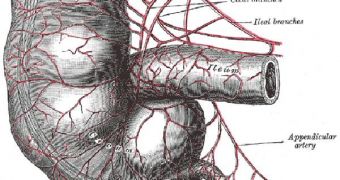The human appendix, a blind-ended tube connected to the cecum, was believed to be just a useless evolutionary remnant, which served no practical purpose, for a long time. That was until two years ago, when researchers finally managed to discover that the location served as a safe-haven for good bacteria, which repopulated the intestines after a dangerous disease. Now, the same scientists are back, with the first-ever history of the appendix, both in humans and in other species.
According to their work, the appendix is a structure that is a lot older than first estimated, and which plays an essential part in ensuring the recovery of the intestines following illnesses. It plays the same role in humans and other animals, and its origins can be traced back to more than 80 million years ago. “Maybe it's time to correct the textbooks. Many biology texts today still refer to the appendix as a 'vestigial organ,'” Duke University Assistant Professor of Surgical Sciences William Parker, PhD, explains. He is also the senior author of the new study, which appears in the latest issue of the Journal of Evolutionary Biology.
“Darwin simply didn't have access to the information we have. If Darwin had been aware of the species that have an appendix attached to a large cecum, and if he had known about the widespread nature of the appendix, he probably would not have thought of the appendix as a vestige of evolution.” the expert adds. He reveals that the appendix is a structure that is fairly widespread in nature. “For example, when species are divided into groups called 'families,' we find that more than 70 percent of all primate and rodent groups contain species with an appendix,” Parker says.
It may also be that the condition known as appendicitis, which is in fact what happens when the appendix gets an inflammation, is caused not by infection in the structure itself, but rather in lifestyle changes associated with changing one's usual environment, and also with increased sanitation. Though this may seem a bit redundant, increased sanitation takes a huge strain off our immune system, which thus has nothing to fight. Parker and others say that this is a recipe for trouble.
The only solution that the expert sees for this problem is to find a way to stimulate the immune system in very much the same way it was in the Stone Age. “If modern medicine could figure out a way to do that, we would see far fewer cases,” he concludes, quoted by ScienceDaily.

 14 DAY TRIAL //
14 DAY TRIAL //